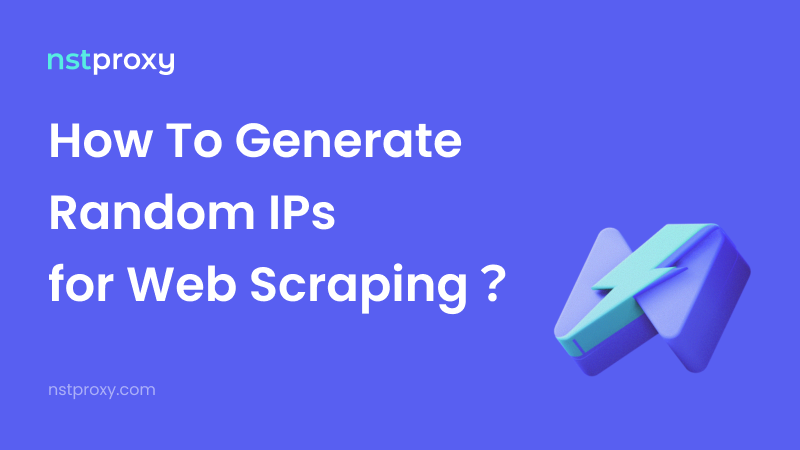Introduction
In the digital age, an IP address is the unique identifier for devices on a network. For tasks like web scraping, market research, or data analysis, frequent IP address changes are crucial. This not only effectively circumvents website anti-scraping mechanisms but also ensures the anonymity and data integrity of operations. This article will delve into the principles of random IP address generation and highlight how to leverage Nstproxy's powerful proxy services to achieve efficient and stable IP rotation, especially when facing complex anti-scraping strategies and AI application scenarios. We will explore how Nstproxy provides superior solutions.
What is an IP Address?
An IP address is a numerical label used in the Internet Protocol to identify network devices. It's akin to a postal address in the real world, ensuring that data packets are accurately delivered from source to destination. Currently, IPv4 is the most widely used version, consisting of four groups of numbers from 0 to 255, such as 192.168.1.1. However, with the proliferation of internet-connected devices, IPv4 address resources are becoming scarce. IPv6, as the next-generation standard, offers an almost infinite address space and a more complex format, for example, 2001:0db8:85a3:0000:0000:8a2e:0370:7334. Understanding the structure of IP addresses is fundamental to effective IP management.
Feasibility of Random IP Address Generation
Generating random IP addresses is entirely feasible. IP addresses adhere to strict structural and range regulations, making programmatic generation of valid IP addresses possible. However, not all generated IP addresses can be used on the public internet. The Internet Assigned Numbers Authority (IANA) manages IP address allocation and reserves certain IP ranges for special purposes, such as local communication or test networks. Therefore, a practical random IP generator needs to identify and exclude these reserved addresses, ensuring that the generated IP addresses are routable and valid. For instance, 10.0.0.0/8 and 192.168.0.0/16 are common private network IP segments that should not be used for public web scraping.
Practical Random IP Generation in Python
In Python, we can easily generate random IP addresses using built-in libraries. Here's a simple example for generating a valid IPv4 address:
import random import ipaddress def generate_random_ipv4(): while True: # Generate four octets for a random IPv4 address ip_parts = [str(random.randint(0, 255)) for
This code uses the random module to generate random numbers and the ipaddress module to validate the IP address and check if it's reserved. For IPv6 addresses, the generation logic is similar but involves handling longer hexadecimal groups. However, generating random IP addresses alone cannot directly hide your true identity. These generated IP addresses are not real network nodes and cannot carry network traffic. To achieve effective IP rotation and anonymity, you need to rely on proxy servers.
Why IP Rotation is Needed? Nstproxy's Solution
Web scraping and data collection face a major challenge: target websites' anti-scraping mechanisms. These mechanisms detect and block automated traffic by analyzing request frequency, IP address reputation, and more. IP rotation is a key strategy to circumvent these limitations. By changing IP addresses after each request or at regular intervals, your traffic appears to originate from different users, significantly reducing the risk of detection and blocking. This is crucial for businesses requiring large-scale data collection, market intelligence analysis, or SEO monitoring.
Nstproxy, as a leading proxy service provider, offers diverse proxy types and a robust IP pool, perfectly aligning with the needs of IP rotation. Nstproxy's residential proxies boast a massive pool of real user IPs, covering over 200 countries and regions worldwide, ensuring high anonymity and success rates. Furthermore, ISP proxies combine the speed of datacenter proxies with the stability of residential proxies, making them an ideal choice for high-performance scraping. For scenarios demanding ultimate speed and stability, Nstproxy's datacenter proxies and IPv6 proxies also provide ample options. Nstproxy's proxy services support not only HTTP/HTTPS protocols but also SOCKS5, catering to various complex network request requirements.
Nstproxy's Unique Value:
- Massive IP Pool: Nstproxy possesses tens of millions of real residential IPs, far exceeding similar products, ensuring an inexhaustible supply of IP resources.
- High Stability and Anonymity: All proxies undergo rigorous screening, guaranteeing 99.9% uptime and extremely high anonymity, effectively preventing IP bans.
- Flexible Billing Models: Offers various billing options, including by traffic, by IP count, or by bandwidth, to meet the needs of different scales and budgets.
- Diverse Proxy Types: Includes residential proxies, ISP proxies, datacenter proxies, IPv6 proxies, and more, covering all application scenarios, especially suited for AI training and data analysis tasks with stringent IP quality requirements.
- Smart IP Rotation: Nstproxy's platform features a built-in smart IP rotation mechanism, allowing users to achieve automatic IP switching at the request level without manual management, effectively reducing the risk of detection.
Practical Cases: Implementing Smart IP Rotation with Nstproxy
Scenario One: Large-Scale E-commerce Data Scraping
An e-commerce analytics company needs to scrape price and inventory information for millions of products globally. With traditional methods, a single IP would quickly be blocked by target websites. By integrating Nstproxy's residential proxies and configuring smart IP rotation, the company can:
- Circumvent IP Blocks: Each request uses a different real residential IP, simulating genuine user behavior, effectively bypassing anti-bot systems.
- Improve Scraping Efficiency: Nstproxy's global IP network ensures low latency and high concurrency, significantly shortening data collection cycles.
- Obtain Accurate Data: By using IPs from the target market's local region, the company ensures that the collected price and inventory information is relevant to local users, avoiding data discrepancies due to geo-restrictions.
Scenario Two: Social Media Sentiment Analysis
A brand marketing agency needs to monitor user comments and sentiment on social media in real-time. Social media platforms have strict restrictions on automated access, and content is often geo-specific. Nstproxy's ISP proxies and geo-targeting capabilities offer an ideal solution:
- Stable and High-Speed Connection: ISP proxies provide datacenter-level speed with residential proxy stability, ensuring smooth real-time data streams.
- Precise Geo-Targeting: By selecting ISP proxies from specific countries, regions, or even cities, the agency can obtain genuine comments from users in those areas for more accurate sentiment analysis.
- Continuous Anonymous Access: Nstproxy's IP rotation feature ensures long-term, uninterrupted anonymous access, preventing account bans.
Scenario Three: AI Model Training Data Preprocessing
An AI company is developing an image recognition model and needs to collect vast amounts of image data from the internet for training. Data sources are widely distributed, and some websites have strict access restrictions. Nstproxy's IPv6 proxies and high concurrency capabilities play a crucial role in this scenario:
- Massive IP Resources: IPv6 proxies provide an almost infinite supply of IP addresses, meeting the demand for large-scale, diverse data sources for AI training.
- Break Through Access Restrictions: For websites that only support IPv6 or have strict restrictions on IPv4 traffic, IPv6 proxies can easily bypass them.
- Accelerate Data Acquisition: Nstproxy's high bandwidth and high concurrency support enable AI models to quickly acquire the necessary training data, shortening development cycles.
Conclusion and Call to Action
Generating and managing random IP addresses is an indispensable part of modern online activities, especially web scraping and AI data collection. While manual IP generation is technically feasible, its limitations in practical applications are evident. Nstproxy offers a one-stop professional proxy solution that helps users easily navigate complex network environments and anti-scraping challenges through its massive IP pool, diverse proxy types, excellent stability, and smart rotation mechanisms. Whether you are conducting large-scale data scraping, market research, or providing high-quality training data for AI models, Nstproxy can be your most reliable partner. Experience Nstproxy today and unlock endless possibilities!
👉 Register with Nstproxy now and embark on your journey of efficient proxy usage!
Key Takeaways
- IP Addresses are Network Identifiers: Understanding IPv4 and IPv6 structures is fundamental to effective IP management.
- Random IP Generation Requires Proxies: Standalone generated random IPs cannot be used directly; anonymity is achieved through proxy servers.
- IP Rotation is Key to Bypassing Anti-Scraping: Frequent IP changes effectively prevent detection and blocking by target websites.
- Nstproxy Offers Comprehensive Proxy Solutions: Features a massive IP pool, high stability, flexible billing, and diverse proxy types.
- Nstproxy Empowers AI and Data Collection: Particularly suited for large-scale, high-demand AI training and data analysis scenarios.
FAQ
Q1: How large is Nstproxy's IP pool?
A1: Nstproxy boasts tens of millions of real residential IPs, covering over 200 countries and regions worldwide, ensuring ample and high-quality IP resources for users.
Q2: What is a residential proxy, and how does it differ from a datacenter proxy?
A2: Residential proxies are IP addresses from real home users, offering extremely high anonymity and making them difficult to identify as proxies. Datacenter proxies come from datacenter servers, offering high speed but relatively lower anonymity, making them easier for websites to detect. Nstproxy offers ISP proxies that combine the best of both, balancing speed and anonymity.
Q3: How does Nstproxy ensure proxy stability?
A3: Nstproxy ensures 99.9% uptime for all its proxies through rigorous IP screening mechanisms, continuous IP pool maintenance, and intelligent load balancing technology, providing users with stable and reliable service.
Q4: Can I use Nstproxy for AI data scraping?
A4: Absolutely. Nstproxy's residential, ISP, and IPv6 proxies are particularly well-suited for AI data scraping. They provide high-quality, diverse, and real IPs, helping AI models acquire richer and more accurate training data while circumventing complex anti-scraping mechanisms.
Q5: Which protocols does Nstproxy support?
A5: Nstproxy supports HTTP, HTTPS, and SOCKS5 protocols, capable of meeting the demands of various complex network requests and application scenarios.



